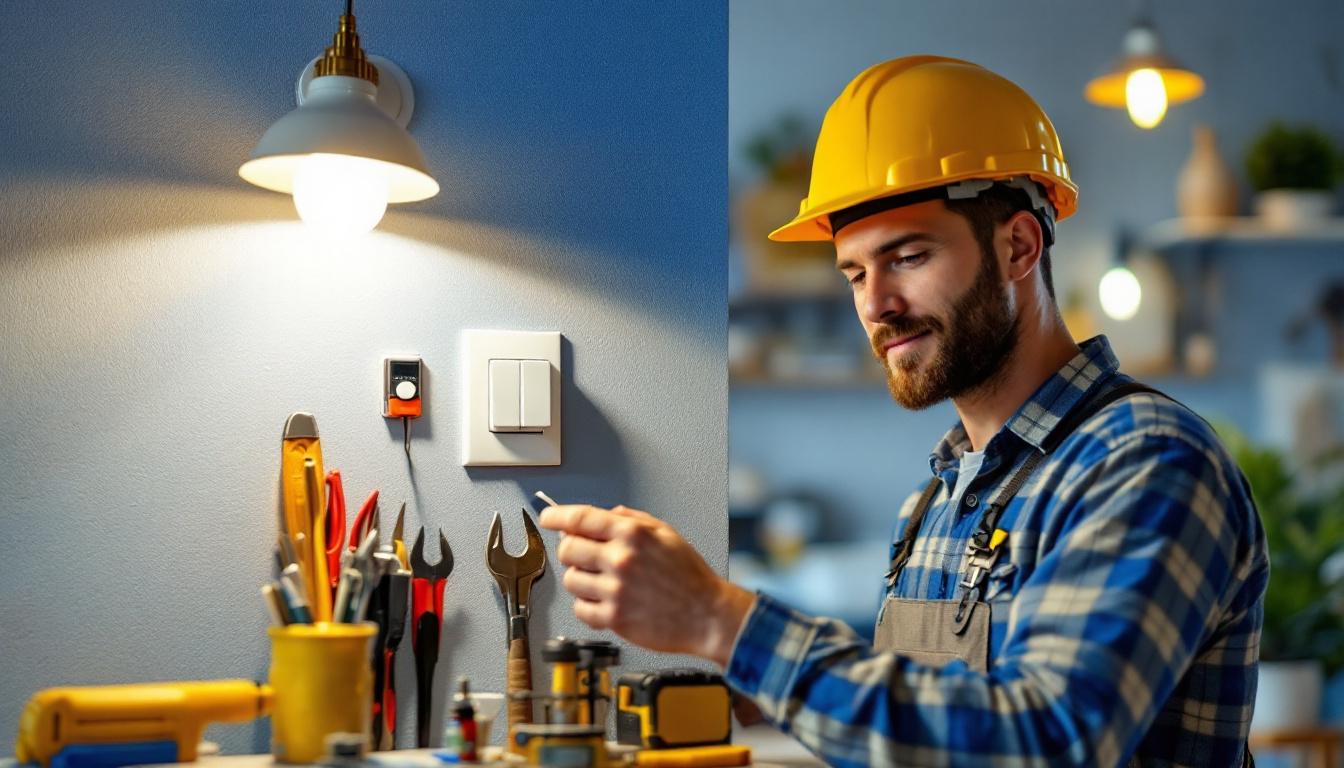
In the ever-evolving world of lighting solutions, understanding the nuances of different light bulb types is crucial for lighting contractors. Among these, Type B light bulbs have garnered attention for their unique features and applications. This article delves into what Type B bulbs are, their significance, and how they can impact the work of lighting contractors.
Light Bulb Type B refers to a specific category of bulbs that are designed primarily for use in enclosed fixtures. These bulbs are distinguished by their unique construction and operational characteristics, which make them ideal for various applications. Knowing the specifics of Type B bulbs is essential for contractors looking to provide the best solutions for their clients.
Type B bulbs typically feature a tubular design that allows for efficient light distribution. They are often constructed with materials that enhance their durability and performance. The design also includes a base that fits standard sockets, making installation straightforward for contractors. This simplicity in design is one of the key reasons why Type B bulbs are favored in both residential and commercial settings. Additionally, many Type B bulbs are designed with a frosted or clear finish, which can affect the quality of light emitted. The frosted versions tend to diffuse light more evenly, reducing harsh shadows and creating a softer ambiance, which is particularly desirable in living spaces and hospitality environments.
One of the standout features of Type B bulbs is their energy efficiency. These bulbs are designed to consume less power while providing the same level of brightness compared to traditional incandescent bulbs. This efficiency not only helps in reducing energy bills for clients but also aligns with the growing demand for sustainable lighting solutions. Contractors who can offer energy-efficient options like Type B bulbs are likely to attract environmentally conscious customers. Furthermore, Type B bulbs often have a longer lifespan than their incandescent counterparts, which means fewer replacements and less waste over time. This longevity not only contributes to cost savings for clients but also supports a more sustainable approach to lighting, making them a smart choice for both new installations and retrofitting projects.
Type B bulbs are versatile and can be used in various settings, making them a valuable addition to a contractor’s toolkit. Their applications range from residential lighting to commercial installations, each bringing unique benefits to the table.
In residential settings, Type B bulbs are commonly used in fixtures such as ceiling fans, chandeliers, and wall sconces. Their ability to provide warm, inviting light makes them a popular choice for living spaces. Additionally, their compatibility with dimmer switches allows homeowners to create the desired ambiance, enhancing the overall aesthetic of the home. Beyond just aesthetics, Type B bulbs also offer a range of color temperatures, allowing homeowners to select the perfect hue for different rooms. For instance, a cooler light may be preferred in a kitchen for its energizing effect, while a softer, warmer light is ideal for bedrooms, promoting relaxation and comfort.
For commercial applications, Type B bulbs are often employed in office spaces, retail environments, and hospitality venues. The bright, clear light they emit can improve visibility and create a welcoming atmosphere for customers and employees alike. Furthermore, the energy savings associated with these bulbs can lead to significant cost reductions for businesses, making them an attractive option for contractors working in the commercial sector. In addition to their energy efficiency, Type B bulbs are known for their longevity, often lasting up to 25,000 hours or more, which minimizes maintenance costs and disruptions in busy commercial settings. This durability is particularly beneficial in high-traffic areas where frequent bulb replacements would be impractical and costly.
Type B bulbs are also making their mark in outdoor lighting applications. They can be effectively utilized in landscape lighting, providing illumination for pathways, gardens, and patios. Their weather-resistant designs ensure they can withstand various environmental conditions, making them suitable for outdoor fixtures. Moreover, the soft glow of Type B bulbs can enhance the beauty of outdoor spaces, creating a warm and inviting atmosphere for evening gatherings or events. Additionally, with the growing trend of smart outdoor lighting, many Type B bulbs are now compatible with smart home systems, allowing homeowners to control their outdoor lighting remotely and set schedules for added convenience and security.
Incorporating Type B bulbs into a contractor’s offerings can provide numerous benefits. Understanding these advantages can help contractors position themselves more effectively in the market.
By recommending Type B bulbs, contractors can enhance client satisfaction. The combination of energy efficiency, aesthetic appeal, and versatility ensures that clients receive a product that meets their needs while also being cost-effective. Satisfied clients are more likely to return for future projects and refer the contractor to others, fostering business growth.
The lighting industry is highly competitive, and staying ahead requires a keen understanding of market trends. By embracing Type B bulbs, contractors can differentiate themselves from competitors who may still rely on outdated lighting solutions. Offering modern, efficient options demonstrates a commitment to quality and innovation, which can be a significant selling point.
While Type B bulbs are generally easy to install, there are specific considerations that contractors should keep in mind to ensure optimal performance and safety.
Before installation, it is crucial to verify that the fixtures are compatible with Type B bulbs. These bulbs are designed for enclosed fixtures, and using them in open fixtures can lead to overheating and reduced lifespan. Contractors should educate clients about the importance of using the correct fixtures to maximize the benefits of Type B bulbs.
Contractors must also pay attention to the wattage and brightness of Type B bulbs. Different applications may require varying levels of brightness, and selecting the appropriate wattage is essential for achieving the desired lighting effect. Providing clients with guidance on this aspect can further enhance their satisfaction and trust in the contractor’s expertise.
When considering the overall value of Type B bulbs, cost-effectiveness plays a significant role. While the initial purchase price may be higher than traditional bulbs, the long-term savings can be substantial.
Type B bulbs typically have a longer lifespan compared to incandescent bulbs, which means fewer replacements and reduced maintenance costs. This longevity is particularly beneficial for commercial clients who may have numerous fixtures to maintain. By highlighting the long-term savings associated with Type B bulbs, contractors can make a compelling case for their use.
As previously mentioned, Type B bulbs are designed to be energy-efficient. The reduction in energy consumption translates to lower electricity bills, which is a significant selling point for both residential and commercial clients. Contractors can provide estimates of potential savings based on usage patterns, further reinforcing the value proposition of Type B bulbs.
Another important aspect for lighting contractors to consider is the regulatory compliance and standards associated with Type B bulbs. Understanding these regulations can help ensure that installations meet local codes and standards.
Many regions have implemented energy codes that dictate the types of lighting products that can be used in new constructions and renovations. Type B bulbs often meet or exceed these codes, making them a compliant choice for contractors. Familiarity with local regulations can help contractors avoid potential fines and ensure that their projects are completed smoothly.
In addition to energy codes, safety standards are paramount in the lighting industry. Type B bulbs are typically designed with safety features that prevent overheating and reduce the risk of fire hazards. Contractors should always verify that the products they use comply with relevant safety standards to protect both themselves and their clients.
The lighting industry is continuously evolving, and staying informed about future trends can help contractors remain relevant and competitive. Type B bulbs are likely to play a significant role in these developments.
As smart home technology becomes increasingly popular, the integration of Type B bulbs with smart lighting systems is on the rise. Many Type B bulbs now come with smart capabilities, allowing users to control brightness, color temperature, and even scheduling through mobile apps. Contractors who embrace this technology can offer clients modern solutions that enhance convenience and energy efficiency.
With a growing emphasis on sustainability, the demand for energy-efficient lighting solutions is expected to rise. Type B bulbs, with their energy-saving features, align perfectly with this trend. Contractors who prioritize sustainable options will not only meet client demands but also contribute to broader environmental goals.
In summary, Light Bulb Type B is an essential component of modern lighting solutions that offers numerous benefits for lighting contractors. From their unique design and energy efficiency to their versatility in various applications, Type B bulbs can enhance client satisfaction and help contractors stay competitive in a rapidly changing market.
By understanding the installation considerations, cost-effectiveness, regulatory compliance, and future trends associated with Type B bulbs, contractors can position themselves as knowledgeable experts in the field. Embracing these bulbs not only meets the demands of clients but also contributes to a more sustainable and efficient lighting landscape.
As the lighting industry continues to evolve, staying informed and adaptable will be key for contractors looking to thrive. Type B bulbs represent a significant opportunity to enhance offerings and provide clients with the quality and efficiency they expect. By integrating Type B bulbs into their projects, lighting contractors can pave the way for a brighter, more sustainable future in lighting.
Ready to elevate your lighting projects with the efficiency and sustainability of Type B bulbs? Look no further than LumenWholesale for all your lighting needs. Our extensive selection of spec-grade lighting products ensures you have access to the highest quality options at wholesale prices that can’t be beaten. Say goodbye to inflated markups and hello to premium lighting with the convenience of free shipping on bulk orders. Don’t compromise on quality or value—choose LumenWholesale for the perfect blend of affordability and performance. Explore our collection now and secure the best value in wholesale lighting.

Discover innovative cost-saving strategies for lighting contractors in the landscaping industry.

Discover how electricity tools are revolutionizing the lighting industry, offering lighting contractors a competitive edge with enhanced efficiency, precision, and innovation.

Discover how proximity to film sets can be a game-changer for lighting contractors.

Discover the essentials of timer electrical switches with our comprehensive guide tailored for lighting contractors.